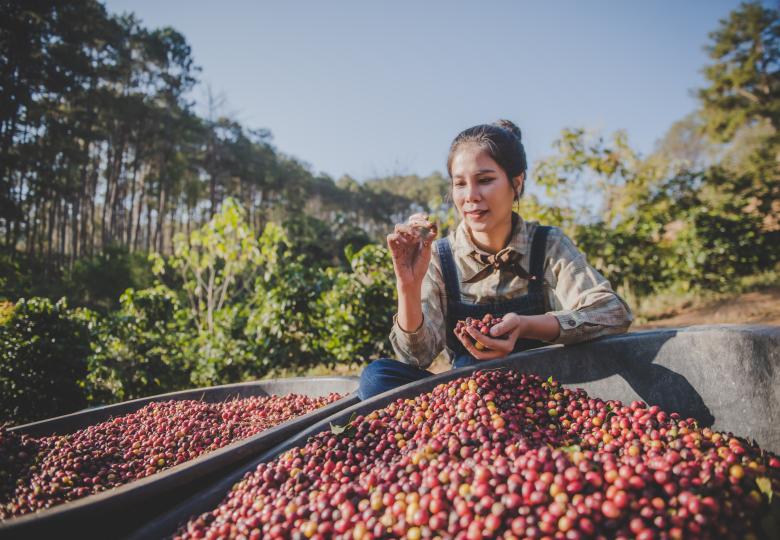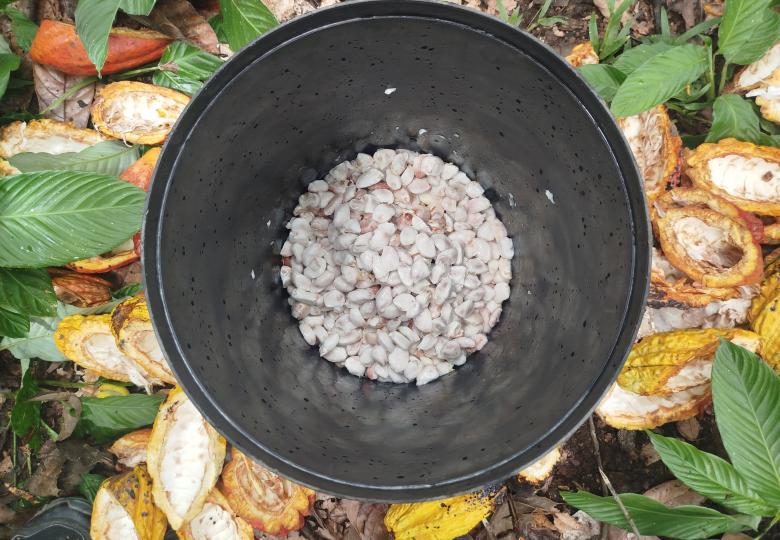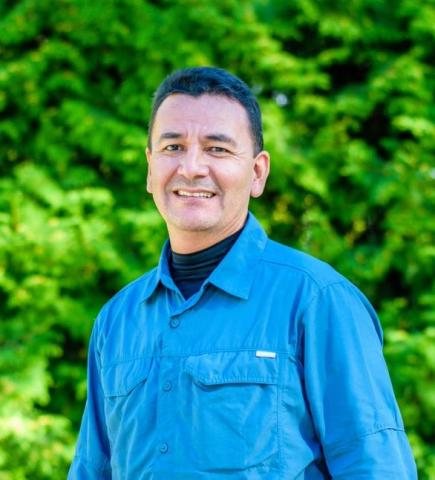National Risk Assessment and Strengthening of Local Capacities for the Implementation of Due Diligence Systems in Cocoa Value Chains.
National Risk Assessment and Strengthening of Local Capacities for the Implementation of Due Diligence Systems in Cocoa Value Chains”, aimed at supporting smallholder producer organisations in their process of adaptation and alignment with the European Union Deforestation Regulation (EUDR1).
The EUDR covers seven commodities, wood, rubber, coffee, cocoa, palm oil, soy, and cattle and their derivatives. It requires companies importing into or exporting within the EU to carry out due diligence, including risk assessment and mitigation, to prevent deforestation and ensure compliance with producer country laws. Ecuador is the world’s third-largest cocoa producer, yet it continues to experience significant natural forest loss due to deforestation and land-use changes. These forests remain under threat from the expansion of agriculture, livestock farming, and timber extraction.
At the same time, cocoa production and export represent the country’s fourth most important economic activities, involving various actors in the supply chain, including medium, small, and micro producers, primarily located in the Costa and Amazonía regions.
According to official statistics, there are approximately 397,000 cocoa producers in Ecuador, of whom around 70% are considered smallholders with farms of less than 5 hectares (some with between 5 and 20 hectares). These small producers, whether organised or not, are the primary source of income for over 150,000 Ecuadorian families. Additionally, 84% of producers operate under conventional systems, and only 15% are organised and have access to some certification, such as Organic, Fair Trade, or Rainforest Alliance.
The EUDR presents significant challenges for actors across the cocoa supply chain, not only in terms of deforestation-free production, but also regarding legal compliance and traceability throughout the production and commercialisation process. In this context, building local capacity to adapt to and comply with this new international regulatory framework is essential for the long-term sustainability of the sector.
The direct beneficiaries of the project were more than 3,000 smallholder cocoa producers and their 11 associate organisations, located in four provinces across Ecuador, in the Costa and Amazonía regions. These included organisations:
- In Esmeraldas (Costa), APROCANE, REDESCOPE, UOPROCAE, and FONMSOEAM
- In Tena (Amazonía), KALLARI
- In Sucumbíos (Amazonía), APROCAHS and APROCEL
- In Los Ríos (Costa), the Unión y Progreso Residents' Association (AMUP),
- In Guayas (Costa), UNOCACE and Asociación 2 de Mayo.
The project also benefited other public and private stakeholders, both directly and indirectly connected to the cocoa supply chain in Ecuador. The project involved developing a national-level risk assessment for the cocoa sector, intended to serve as a national reference for implementing DDS in cocoa supply chains designed for the European Union (EU) market, regardless of the specific actors involved.
General Objective
To strengthen the capacities of stakeholders in Ecuador’s cocoa supply chain to prepare the sector for compliance with the EUDR, considering the intersectionality of the supply chain and the diverse cocoa-producing regions of the country.
Specific Objectives
- SO1: Develop a national risk assessment aligned with the requirements of EUDR, with a focus on the cocoa supply chain in Ecuador.
- SO2: Implement a training programme on DDS, risk analysis, and risk mitigation related to the EUDR for public and private actors involved in cocoa production and export chains to the EU.
- SO3: Strengthen the capacities of local partners supporting the implementation of DDS pilot projects in smallholder cocoa producer organisations.
- SO4: Document lessons learned from the DDS pilots and develop technical resources or tools to guide and reinforce the implementation and sustainability of DDS within the EUDR framework, with the participation of smallholder producer organisations.

This project aims to strengthen the technical and institutional capacities of stakeholders in Ecuador’s cocoa supply chain, focusing on small and micro producers. It also helps facilitate their effective adaptation to the requirements of the EUDR.
Agricultural expansion, livestock farming, and logging continue to drive deforestation in Ecuador, while rural communities face increasing socioeconomic challenges. In this context, cocoa production, the country’s fourth-largest economic sector and a key driver of family-based rural economies in regions such as Costa and Amazonía, is directly impacted by the new demands of the European market.
Through three core pillars: (i) capacity building for EUDR compliance, (ii) implementation of Due Diligence Systems (DDS), and (iii) mitigation of production-related risks, the project aims to support local cocoa value chain actors in meeting the regulation’s requirements. This includes knowledge dissemination, technical assistance, training, and the development of practical tools to support compliance with legal, zero-deforestation, and traceability criteria.
Pilot projects were implemented using a territorial approach to identify and mitigate risks and to establish DDS. Key actors in the implementation include smallholder producers and their associations that export directly or are part of export supply chains to the EU, as well as public and private stakeholders directly or indirectly involved in the cocoa chain.
The project is led by the German Cooperation GIZ Ecuador and implemented by Preferred by Nature, within the framework of the global programmes “Sustainable Agriculture for Forest Ecosystems” (SAFE) and “GIZ AgriChains”2. This initiative contributes to the long-term sustainability of the cocoa sector by promoting environmental sustainability and the socioeconomic well-being of producer communities, while also enhancing local capacities to meet regulatory and international market requirements.
Main activities
- EUDR Risk Assessment: a risk assessment was developed with a focus on the cocoa chain in Ecuador against the requirements of the EUDR. Based on the identification of risks, a proposal was made for mitigation measures or actions that could be taken by actors (producers, associative organisations, stockpilers, traders, processors, exporting companies, etc.), to focus their efforts on adapting or aligning their practices to the requirements of the European market in compliance with EUDR.
- Training and awareness-raising on the EUDR for producers, smallholder producer organisations, public and private sector actors, development agencies, and local NGOs.
- Capacity building for smallholder producer organisations on the design, implementation, and assurance of DDS.
- At a national level for the cocoa supply chain, continuous support and advisory services for producer organisations in:
(i) conducting risk assessments in line with the EUDR, and
(ii) designing and implementing risk identification and mitigation plans. - Implementation of “mock audits” or simulations to assess DDS implementation in three producer organisations: one first-tier organisation (Kallari Association) and two second-tier organisations (UNOCACE and the Federation of Black and Mestizo organisations of Southwest Esmeraldas, Atacames and Muisne – FONMSOEAM).
- Development and distribution of the “Toolbox”, including guidance documents and templates to support and facilitate DDS implementation within smallholder producer organisations.
References:
[1] The EUDR entered into force in July 2023 and will become mandatory in December 2025 for large and medium-sized operators and traders, and in June 2026 for micro and small enterprises. The regulation applies to seven commodities and their derivatives—wood, rubber, coffee, palm oil, soy, cattle, and cocoa. It requires companies that import or export to/from the EU to conduct due diligence (DD), including risk identification and assessment, to demonstrate that these commodities or their derivatives are not linked to deforestation or forest degradation, nor associated with producers, processors, or traders that violate or fail to comply with legal requirements in the country of origin.
[2] The global GIZ AgriChains programme originated as an initiative designed to enhance sustainability and traceability in agricultural value chains, particularly for key commodities such as cocoa, coffee, palm oil, and soy. Subsequently, in alignment with the requirements of the European Union Regulation on Deforestation-Free Products (EUDR), the programme has also implemented targeted activities to support value chain actors in adapting to the regulation.
Cover photo courtesy: Freddy Peña/Preferred by Nature
Together we are stronger

Strengthening the Competitiveness of the Colombian Agricultural Sector to Facilitate Agricultur...
The coffee, cocoa and palm oil supply chains represent strategic sectors for Colombia’s economic, social, and environmental develo...

National Risk Assessment and Strengthening of Local Capacities for the Implementation of Due Di...
National Risk Assessment and Strengthening of Local Capacities for the Implementation of Due Diligence Systems in Cocoa Value Chai...

Developing legal frameworks and due diligence guidelines for cocoa production in West and Centr...
Côte d'Ivoire, Ghana and Cameroun are key countries producing global cocoa. Cocoa is the country's main cash crop in Côte d’Ivoire...

Innovation Alliance for Training Programmes for Deforestation-Free Supply Chains in Europe (EMM...
Deforestation is the primarily result of the expansion of agricultural land for forest risk commodities (FRCs) such as cattle, woo...
